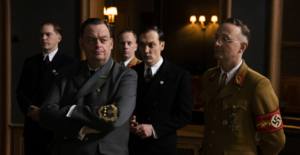La Zone d’intérêt
The Zone of Interest
Grand Prix – Cannes
Best International Feature – Oscars
Best Sound – Oscars
Outstanding British Film – BAFTA
Best Film not in the English language – BAFTA
Best Sound – BAFTA
Meilleur Film Étranger – Césars
2023/2024

FR EN
Un paradis aux portes de l’enfer, quelque part en Petite-Pologne, dans les années quarante, entre deux localités aux noms peu évocateurs de prime abord : Oświęcim et Brzezinka. Ces toponymes ne vous disent rien ? Leur traduction allemande : Auschwitz et Birkenau. C’est là où meurent quotidiennement des centaines de personnes, mais aussi là où vit paisiblement la famille de l’Obersturmbannführer Rudolf Höss, dirigeant du plus tristement célèbre camp d’extermination nazi.
Lent, long, voire ennuyeux, « La Zone d’intérêt » est un film qui justement trouble de par l’absolue banalité qu’il dépeint : une épouse (Sandra Hüller) et un mari (Christian Friedel) élevant leurs enfants tout en essayant de concilier travail et idéaux, mais dans un contexte incongru, inapproprié, inhumain. (À proximité d’un charnier de la pire espèce…) Hedwig souhaite simplement entretenir un éden qu’elle a lentement construit (… un espace vital ; lebensraum…), tandis que Rudolf fait de son mieux pour accomplir la tâche qu’on lui a confiée (… épuré de ses indésirables).
Le malaise est d’autant plus saisissant que le long-métrage se compose d’un ensemble de non-dits, d’arrière-plans, de hors-champs qui contrastent avec l’étonnante sérénité de la famille Höss, emmurée à côté d’une abomination d’où jaillissent nuit et jour des flammes, des cris et des coups qui en traumatiseraient plus d’un·e. Mais tout est dans la suggestion de ces abjections, rien n’est explicité, l’on ne peut que deviner ou ignorer ce qui se trame derrière ces clôtures…
Sonore, bruyant, même, peut-être – malgré les silences conversationnels – « La Zone d’intérêt » fait aussi montre d’une mise en scène et d’une photographie (signées Jonathan Glazer et Łukasz Żal) très ordonnées, avec des plans symétriques et des couleurs légèrement ternes et bizarrement artificielles (noir, blanc et rouge …) qui ne font que renforcer le côté infâme de l’intrigue. Pourtant neutre en apparence, ce film glacial ne peut donc que nous inciter à réfléchir sur les atrocités de l’histoire humaine – en particulier de la Shoah – et sur comment en préserver la mémoire.
Axel Chevalier
A paradise at the gateway to hell, somewhere in Lesser Poland, in the 1940s, between two towns with names that don’t seem very evocative at first glance: Oświęcim and Brzezinka. Ring a bell? Their German translation: Auschwitz and Birkenau. This is where hundreds of people die every day, but also where the family of Obersturmbannführer Rudolf Höss, leader of the most infamous Nazi extermination camp, lives peacefully.
Slow, long, even dull, “The Zone of Interest” is a film that is precisely unsettling because of the absolute banality it depicts: a wife (Sandra Hüller) and husband (Christian Friedel) raising their children while trying to reconcile work and ideals, but in an incongruous, inappropriate, inhuman context. (Near a mass grave of the worst kind…) Hedwig simply wishes to maintain an Eden she has slowly built up (… a living space; lebensraum…), while Rudolf does his best to accomplish the task he has been given (… cleansed of the unwanted).
The sense of unease is all the more striking in that the film is made up of a series of unspoken, behind-the-scenes, off-screen elements that contrast with the astonishing serenity of the Höss family, walled in next to an abomination from which flames, screams and beatings emanate night and day, and which would traumatize many a viewer. But it’s all in the suggestion of these horrors, nothing is made explicit, we can only guess or ignore what’s going on behind these fences…
Loud, noisy even, perhaps – despite the silent conversations – “The Zone of Interest” also offers very neat direction and photography (by Jonathan Glazer and Łukasz Żal), with symmetrical shots and slightly dull, strangely artificial colors (black, white and red …) that only serve to reinforce the infamy of the plot. Yet neutral in appearance, this chilling film can therefore only prompt us to reflect on the atrocities of human history – particularly the Holocaust – and how to preserve the memory of them.
Axel Chevalier

